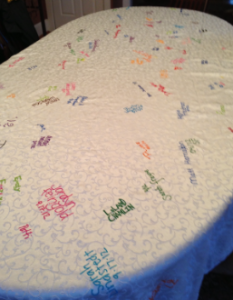 It happens in every family — a rite of passage that marks a new life stage — when you give up, or take over, hosting family holiday dinners. As I take out our Seder plate and Passover dishes, I think back to when I assumed this function for our family, and wonder when my children will assume it for me.
It happens in every family — a rite of passage that marks a new life stage — when you give up, or take over, hosting family holiday dinners. As I take out our Seder plate and Passover dishes, I think back to when I assumed this function for our family, and wonder when my children will assume it for me.
If you’re lucky, these role changes occur over time. You offer to make the chicken soup or brisket, you arrive early to help set up or stay late to clean up. And then one day — you are hosting the holiday meal — and your parents and children are helping you. These are happy transitions, that you make of your own will and where you control the timing. But sometimes, change is thrust upon you, because someone passes away or is ill. These changes are no less natural, but metaphorically and physically, there is an empty place at the table.
There seems to be no set age when you “become the grown up.” Some people host holiday meals well into their eighties; others shift the responsibility in their fifties, sixties or seventies. I’m not sure how families decide when to change their routine and custom.
Passover is unique, perhaps, because you can host the holiday meal while a parent can lead the Seder. You can assume the physical work, and an older family member can still have the role of patriarch or matriarch. Perhaps every religion has holidays and rituals that pass this same way from one generation to another.
My husband and I are hosting Passover this year, but already my kids have started the Passover passage. My daughter is arriving the night before to help set up and prepare her famous matzo-spinach lasagna. My older son is helping his dad make chicken soup, and my younger son will help arrange our furniture to accommodate a crowd of 20. We plan to hold Seder at our house for many years to come, but we are grateful for the help, and thankful that our kids are interested in preserving the tradition.
As with all holiday traditions, initiating change is hard. When we once suggested moving away from brisket, there was widespread family rebellion. Every departure from a favorite dish, it seems, is suspect or outright vetoed in advance. Dishes served year after year become comfort foods that define the holiday. And in part, I like this. For decades, a friend’s mother prepared a broccoli-corn casserole for Thanksgiving. Although her mom died five years ago, my friend and her dad still prepare the same broccoli-corn casserole together every year. In doing so, they honor her mother’s memory, and more important in my mind, they celebrate the relationship she has with her dad.
I heard today about a new custom, a lovely one, and although I am not sure it is right for us, it may be for others. Each year, everyone who attends this Seder signs their name on the tablecloth. My friend then embroiders the names, and the next year, the same tablecloth is used and that year’s names are added. They are starting their third year of this tradition, and already her children have said that this tablecloth is one of the things they most want when they “grow up.”
Personally, I like incorporating new traditions in with the old. It makes holidays into living things that evolve and change over time. Passing the baton to the next generation on Passover is like that too. It is as if, through change, we keep things the same.




